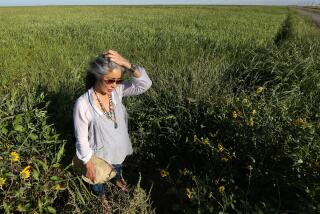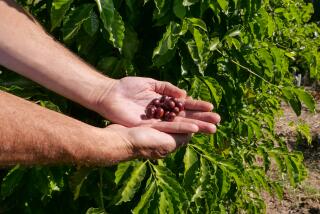Hawaiian Growers Want Empty Fields Filled to the Brim, With Coffee
- Share via
HONOLULU — What France is to wine and Italy is to pasta, Hawaii wants to be to coffee.
So, javaheads, listen up.
Connoisseurs say, stop looking for the best gourmet coffee in Jamaica, Kenya or Colombia. Hawaii is the way to go--right down to the last drop.
Where sugar cane and pineapple farms once spread across thousands of acres, rows and rows of coffee trees now stand.
Since competition from cheap foreign markets has forced most of Hawaii’s plantations to close, growers are now searching for a new alternative cash crop to keep the island green. They hope coffee will be hot.
“Hawaii’s coffee is virtually unknown now, but Hawaii can make its region as well known as others if it learns how,” said Ted Lingle, executive director of the Specialty Coffee Assn. of America in Long Beach.
So over the last 12 years, producers of the only coffee grown in an American state have been selling their crop all over the world, transforming their industry from a $4-million-a-year business to one with sales of $20 million annually. Many believe it has the potential to bring in millions more.
The land cultivated for coffee occupies only a fraction of the thousands of acres once planted in sugar, but some, like H.C. Bittenbender, chairman of the horticulture department at the University of Hawaii, say coffee could be as lucrative as sugar was at its peak.
Before Hawaii’s sugar industry began to wane in 1980, it brought in more than $5 billion to the state economy.
That potential has led to some debate over what constitutes the real thing.
*
From the mountains of the island of Hawaii to the lush valleys of Kauai, about 6,900 acres are now covered with trees that sport bright-red coffee cherries.
But it is on the western slopes of Hawaii Island, under the ideal greenhouse conditions of intense morning sun and cloud-covered afternoons, where one of the best grades of coffee in the world grows.
Kona coffee has been grown on the island since the late 1800s by individual farmers who handpicked the beans on their small farms. Even today, they still take pride in the extra care they give to the cherries.
That’s why Kona coffee has become the second-most expensive regularly available coffee in the world, Lingle said.
At $20 to $30 per pound, connoisseurs of the jolt juice say the taste is worth the price for a cup of Kona. The most expensive coffee, Kope Luwok coffee from Indonesia, sells for about $130 a pound.
“I have about a dozen customers who are faithful Kona coffee drinkers, and they are willing to pay top price for the taste,” said Kathy Maddux, owner of Coffee Manoa coffee shop.
Tourists who visit Kona’s 600 small farms can see families picking coffee beans in their backyards or coffee beans spread to dry in their driveways--just like scenes from small village streets.
But farmers say that lifestyle and tradition are threatened as technology and big coffee companies enter the island.
As more farms open on other islands, Kona coffee is being challenged by lower-priced brands of Hawaii-grown coffee, some produced by food conglomerates.
Former big-time sugar and pineapple plantation companies, such as Dole Food Co. Hawaii and A&B-Hawaii;, are finding high-end profitability in coffee.
Over the last year, A&B-Hawaii; started producing much of the state’s crop on its 4,000 acres on Kauai. And since cheap labor is hard to find in Hawaii, the personal touch to farming is out and large harvesting machines are in.
Some view the change as a good thing.
Kona coffee “is just too expensive,” said John Alverez, general manager for four Coffee Gallery shops on Oahu. “We’re featuring other Hawaiian coffees right now.”
But some Kona farmers are nervous, saying that, although they’re glad to see Hawaii’s coffee industry expanding, they’re worried about protecting their product’s reputation. They fear damage from the sale of bogus Kona coffee, or from blends containing only small amounts of Kona coffee.
“Selling Kona blends is just selling the image, not the real taste,” said John Langenstein, a 21-year veteran Kona coffee farmer.
Not so, said Al Kam, president of the Superior Royal Kona Coffee Co., the major roaster of Kona coffee in Honolulu.
“You want 100% Kona, I’ll give it to you, but blended Kona gives you a well-rounded, full-bodied cup,” he said.
Either way, the fact remains that some are duped into buying bogus Kona coffee. The owner of a coffee supplier in California was charged last year in federal court with selling millions of pounds of bogus Kona beans to unwitting beverage retailers nationwide.
To protect themselves, Langenstein and a small group of Kona farmers are working to get a federal certification mark on their coffee. They say its no different from what Maui has done for its onions and Idaho has done for its potatoes.
It’s all in good taste.
More to Read
Inside the business of entertainment
The Wide Shot brings you news, analysis and insights on everything from streaming wars to production — and what it all means for the future.
You may occasionally receive promotional content from the Los Angeles Times.










